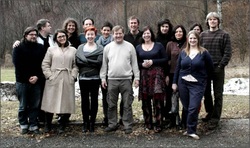Project meeting in Czech Republik, Mlade Buky, 20 – 23 February, 2014

EMOTIONAL INTELLIGENCE
Emotions as a source of energy and success
(summary) (photos) (inspiring exercises)
Thursday 20 February - day of arrival
Friday 21 February:
9 – 12:30 Cornerstones of Emotional Intelligence
What is emotional intelligence?
Practical ways to improve emotional intelligence
Emotions, their origins and the ways of coping them and to use them in daily life
The neurobiology of the brain and the two resulting basic ways to cope with emotions
Exercises: “Pyramid”, “Find your emotions”, “Noise of mind”, “Adequate and nonadequate reaction”, “Telling story”, “Grounding”
14:30 – 18:00 The trip to Kuks
Tour of baroque sights and exercises: “Virtues and Vices”
20:00 – 21:30 Exercises: “Power of emotions”
Saturday 22 February:
9 – 12:30 Instincts - needs – behavior
Hidden links between basic human's instinctive facilities and external manifestations of man’s behavior
The roots of conflict, quick orientation in causes of conflict and the conflict management
Principles of making motivation and creative environment
Exercises: “Controlled approaching”, “Chocolate”, “Can you hear me?”, “I like…”
14:30 – 18:30 The journey to responsibility and personal-maturity
Uncovering the causes of manipulation strategies
The principle of responsibility. How to lead others from manipulation to responsible and mature communication.
Making agreements and setting limits
Exercises: “Triangle roles”, "Playing with emotions - Games for children and adults", “Animals and 5 emotions”, “Clapping”, “Gelatin bears”
20:00 – 21:00 Project management meeting
Sunday 23 February:
9 – 11 Interconnection between emotional intelligence and practice
How to cope emotional intelligence for children
What happens in the brain of a teenager – a message for parents
Evaluation - discussion, questions, answers
Departure
A resource
Your browser does not support viewing this document. Click here to download the document.
